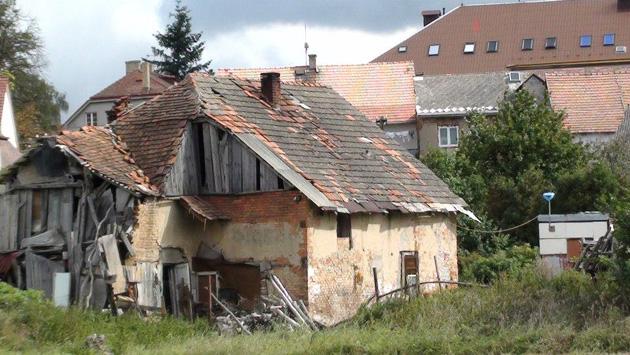If you were to decide to help a family in distress find dignified housing, you would encounter stiff opposition in the East Bohemian town of Libáň. On Wednesday, 20 March 2013, the Libaň town council met to review a request filed by one of its citizens, Stanislav Penc, but only after various individuals, non-state organizations, and state bodies had called on the town to do so. Penc has now received the opportunity to publicly present his request. Last fall he asked the town leadership to agree to his plan to build an apartment building that will feature social apartments.
Stanislav Penc has been a civil and human rights activist since the 1980s. For 10 years he has been running an ecologically-friendly goat farm in the nearby town of Milkovice. One day he learned that a family in Libáň was living in a house that was being foreclosed on and might lose the roof over their heads at any moment. Penc met the family and agreed with them to participate in the auction of the building on their behalf. He borrowed money and purchased the house with cash.
Since the house is in a desolate state, Penc got together with architect David Vávra (who is famous from the television program "Murmuring Towns") and the Committee of Good Will – Olga Havlová Foundation to design a project for a new building on the site. Penc says the project could serve as a model for resolving the situations of other citizens in the town, people who through no fault of their own have gotten into situations they cannot address alone.
Penc discovered he could request a subsidy from the Czech Regional Development Ministry, but only for an apartment building with multiple units, not for a single family home. Penc is not requesting any money from the municipal budget for the project. The only thing that is missing for him to be able to file his request with the ministry is a change to the town plan so that an apartment building with four units can be permitted on the site. By law, he needs the town council to agree to change its zoning plan.
The Mikó family comprises 13 people across three generations. They have lived in the town since the 1950s. In 1986 they purchased the single-family home and an adjacent barn which could also be used as living quarters. During the 1990s, the barn fell apart after an unprofessional drainpipe installation and had to be demolished. Since then the family has lived in other parts of the single-family home where they have improvised repairs, in a small caravan parked on the property, and in a temporary container housing unit on the property. The grandfather of the family, František Mikó, worked his entire life in road maintenance and has done occasional manual labor for various citizens of the town.
At the town council meeting, Mayor Petr Soukup first presented the whole project by saying “We still don’t know who will take care of this building or what the regime will be for administering it.” He then gave the floor to Penc, who once again described the family’s story, adding that his only interest is in helping them and that he is not interested in making a profit. He suggested that a nonprofit organization could be established by the town to administer the building, collect rents, and invest the rents into maintaining the property.
When asked whether someone might want to expand the building in future to include other units, Penc answered that any change to the town plan could establish the maximum number of units for that location. Another town councilor asked Penc whether he had taken a survey among the town’s citizens to see whether they agreed with the project. Penc responded that no citizens have ever complained about the Mikó family and that he didn’t need to find out whether the project was liked or not because that was for the elected town councilors to decide. However, they evidently were concerned that they might not be re-elected if they agreed to the project. When asked who would make up the difference between the subsidies and the actual construction costs, Penc said more money would not need to be raised because the construction work would be done by four members of the family and six volunteers who had previously helped him with repairs to his farm. He also said he could get a large part of the construction materials from donors.
The mayor said that while Penc’s intentions were noble, they were probably more appropriate for a larger town with a social welfare department. According to the mayor, members of “that community” would not be capable of maintaining an apartment building in good technical shape. To avoid accusations of racism, the mayor then proposed that the town councilors make a general decision, as follows: “Does the town council agree with the construction of sponsored apartments here?” The unanimous vote was that they did not.
Through this decision, the town council is preventing not only the Mikó family, but all of its citizens from ever requesting subsidies from the state to build social apartments in future. At the same time, they have made it impossible for citizens of the town to voluntarily help a family in distress acquire dignified housing with the state support that is available irrespective of their skin color.
